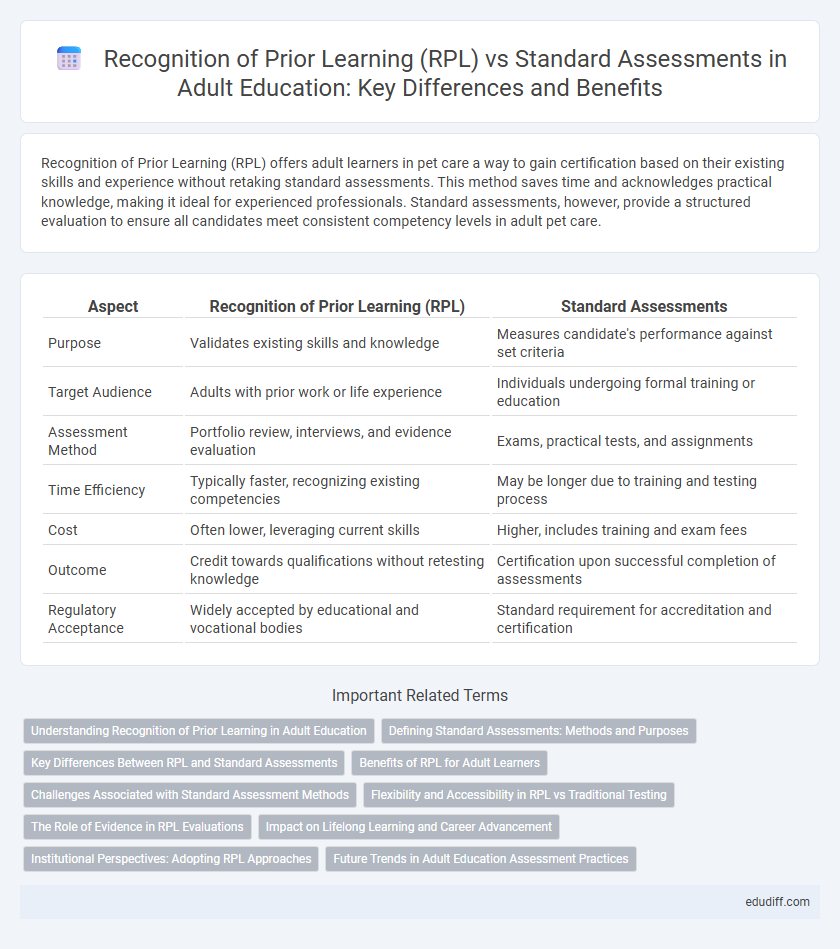Recognition of Prior Learning (RPL) offers adult learners in pet care a way to gain certification based on their existing skills and experience without retaking standard assessments. This method saves time and acknowledges practical knowledge, making it ideal for experienced professionals. Standard assessments, however, provide a structured evaluation to ensure all candidates meet consistent competency levels in adult pet care.
Table of Comparison
| Aspect | Recognition of Prior Learning (RPL) | Standard Assessments |
|---|---|---|
| Purpose | Validates existing skills and knowledge | Measures candidate's performance against set criteria |
| Target Audience | Adults with prior work or life experience | Individuals undergoing formal training or education |
| Assessment Method | Portfolio review, interviews, and evidence evaluation | Exams, practical tests, and assignments |
| Time Efficiency | Typically faster, recognizing existing competencies | May be longer due to training and testing process |
| Cost | Often lower, leveraging current skills | Higher, includes training and exam fees |
| Outcome | Credit towards qualifications without retesting knowledge | Certification upon successful completion of assessments |
| Regulatory Acceptance | Widely accepted by educational and vocational bodies | Standard requirement for accreditation and certification |
Understanding Recognition of Prior Learning in Adult Education
Recognition of Prior Learning (RPL) evaluates an adult learner's existing skills and knowledge, allowing for faster progression without unnecessary repetition. Unlike standard assessments that test newly acquired competencies through formal exams, RPL provides a personalized validation process based on real-world experience and prior training. This approach enhances adult education by reducing time and costs, improving motivation and increasing access to certification for mature students.
Defining Standard Assessments: Methods and Purposes
Standard assessments in adult education are structured evaluations designed to measure learners' knowledge and skills against predefined criteria or competency standards. These methods include written exams, practical tests, and oral interviews, aimed at ensuring consistency and reliability in measuring learning outcomes. They serve to validate learners' proficiency through standardized benchmarks, supporting credentialing and further educational or professional development.
Key Differences Between RPL and Standard Assessments
Recognition of Prior Learning (RPL) evaluates an individual's existing skills and knowledge acquired through work or life experience, bypassing the need for traditional testing methods. Standard assessments measure competency through formal exams or practical tests based on predefined curricula and learning outcomes. RPL offers a flexible, personalized approach, while standard assessments ensure consistent evaluation across all candidates.
Benefits of RPL for Adult Learners
Recognition of Prior Learning (RPL) offers adult learners a streamlined pathway to gain formal qualifications by validating existing skills and knowledge, reducing the time and costs associated with traditional assessments. RPL enhances learner engagement by acknowledging real-world experience, increasing motivation and confidence in pursuing further education or career advancement. This method supports lifelong learning and workforce adaptability, making it especially beneficial for adults balancing education with personal and professional commitments.
Challenges Associated with Standard Assessment Methods
Standard assessment methods in adult education often present challenges such as limited flexibility, which can hinder accurate evaluation of diverse learner experiences and competencies. These assessments typically emphasize theoretical knowledge over practical skills, potentially disadvantaging mature learners with significant workplace expertise. Additionally, time constraints and standardized formats can restrict the ability to demonstrate real-world proficiency, making Recognition of Prior Learning (RPL) a more inclusive and personalized alternative.
Flexibility and Accessibility in RPL vs Traditional Testing
Recognition of Prior Learning (RPL) offers greater flexibility by allowing adult learners to demonstrate competencies through existing skills and experiences, bypassing rigid, time-bound assessments typical of standard testing. RPL enhances accessibility by accommodating diverse learning styles and schedules, reducing barriers linked to formal examination conditions. Traditional assessments often require extensive preparation and fixed testing environments, limiting opportunities for individuals balancing work, family, or other commitments.
The Role of Evidence in RPL Evaluations
Evidence in Recognition of Prior Learning (RPL) evaluations plays a critical role by validating an individual's existing skills and knowledge without the need for traditional assessments. Unlike standard assessments that rely heavily on exams or practical tests, RPL prioritizes diverse evidence such as portfolios, work experiences, and certifications to substantiate competency. This evidence-based approach ensures personalized learning recognition, accelerating qualification achievement and enhancing workforce integration.
Impact on Lifelong Learning and Career Advancement
Recognition of Prior Learning (RPL) accelerates career advancement by validating existing skills and knowledge, reducing the time and cost required to obtain formal qualifications compared to standard assessments. It fosters lifelong learning by encouraging adults to reflect on and document experiential learning, promoting continuous personal and professional development. Unlike standard assessments, RPL enhances workforce mobility and employability by recognizing diverse learning pathways and competencies acquired outside traditional education systems.
Institutional Perspectives: Adopting RPL Approaches
Institutions adopting Recognition of Prior Learning (RPL) approaches increasingly value the formal acknowledgment of adult learners' existing skills and experiences, which accelerates credentialing and reduces redundancy in training. RPL promotes flexible assessment frameworks that align with workforce demands while ensuring quality and equity in credentialing processes. This paradigm shift supports lifelong learning policies and enhances institutional capacity to provide inclusive educational pathways for non-traditional students.
Future Trends in Adult Education Assessment Practices
Recognition of Prior Learning (RPL) is increasingly integrated with digital credentialing platforms, enabling seamless validation of informal and experiential learning compared to traditional standard assessments. Emerging AI-driven adaptive assessments tailor evaluation processes to individual learner profiles, enhancing accuracy and engagement beyond standardized testing methods. Blockchain technology is poised to revolutionize credential verification, ensuring secure and transparent documentation of RPL outcomes in adult education.
Recognition of Prior Learning (RPL) vs Standard assessments Infographic

 edudiff.com
edudiff.com